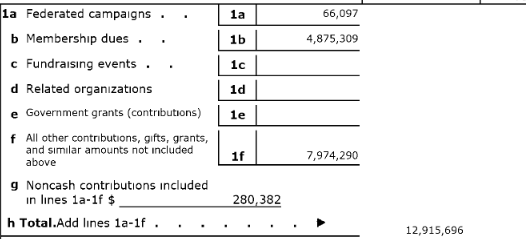

Income and revenue disclosures. Several more millions go on top of that, making the total nearly $16 million (see below).
THE FSF says that about half of its revenue comes from members. That's not too bad compared to a bunch of other non-profits we've studied closely over the years. At the FSFE, by contrast, the full-time staff has become almost like a corporate European outpost for Americans, partly a lobbying operation, as noted by Daniel Pocock (he saw it from the inside, taking stock of Fellows' diminishing involvement). Google plays a big role at the FSFE. It also pays the EFF. Google was a top sponsor of the FSF for a number of years. No need for a Microsoft fixation when Google itself is also problematic (it censors communications, silencing dissent, truth and so on).
"They're slightly involved in Europe ("foreign activity"), albeit nowhere as much as in the US."While it's publicly known today's EFF is funded partly (maybe mostly) by oligarchs and monopolistic corporations, how much exactly is not publicly known, as there's no detailed breakdown. We'll come to that in a moment. This isn't the first time we examine the EFF's finances (it's about the fourth time in recent years). They're slightly involved in Europe ("foreign activity"), albeit nowhere as much as in the US. They never ever speak about EPO corruption (not in their financial overlords' personal interest... super-rich people like Mark Cuban).
Earlier this month someone published "Firefox usage is down 85% despite Mozilla's top exec pay going up 400%" (we had highlighted a similar problem a year ago). To quote:
One of the most popular and most intuitive ways to evaluate an NGO is to judge how much of their spending is on their programme of works (or "mission") and how much is on other things, like administration and fundraising. If you give money to a charity for feeding people in the third world you hope that most of the money you give them goes on food - and not, for example, on company cars for head office staff.
Mozilla looks bad when considered in this light. Fully 30% of all expenditure goes on administration. Charity Navigator, an organisation that measures NGO effectiveness, would give them zero out of ten on the relevant metric. For context, to achieve 5/10 on that measure Mozilla admin would need to be under 25% of spending and, for 10/10, under 15%.
[PDF] (bar Form 990-T, which we'll come to later).

[PDF]. It's not particularly interesting; it's about repeal of “parking tax” provision, explained as follows less than a year ago:
The U.S. Senate today passed government funding legislation for the 2020 fiscal year. The legislation includes a measure to repeal what is commonly referred to as the “parking tax”—that is, section 512(a)(7) that requires tax-exempt organizations to include in unrelated business taxable income the amounts they pay or incur on qualified transportation fringe benefits.
"In pursuit of money for supposed 'growth' institutions like these typically get worse, not better, over time (as they're run by people looking to justify and increase their own salaries/bonuses)."We should add a closing note about the cautionary tale which is the Open Source Initiative (OSI), an institution which this year banned its very own co-founder (the other co-founder had left in protest). 95% of the OSI's money comes from corporations such as Microsoft and the OSI is run by a major hypocrite who might also be a Windows user (hard to tell by his wallpaper what he uses, but it's almost definitely not Open Source like BSD or GNU/Linux). The OSI became a 'washing machine' of Microsoft money. Microsoft 'donates' and this money is then funnelled, tax-free, to Microsoft employees in GitHub. Well, no wonder OSI's GM quit this past summer, without even waiting for a successor to be appointed. Microsoft has always been a lot more of a cult than a company, looking to take over its opposition. Microsoft's "success" did not require any technical excellence at all, just subversive and illegal tactics. The way we see it, Microsoft killed OSI with bribes but finally sealed the deal (OSI becoming a casualty) this year with various new bizarre appointments, a lack of purpose, and resignations. The lack of identity, or defection to working against one's own goals, is why it's apt to call this year's OSI a Microsoft 'washing machine' (or launderette, like tax evasion and influence peddling). Where is antitrust involved? No such thing under Donald Trump. In fact, the Linux Foundation's Jim Zemlin went out of his way to help Microsoft take over GitHub (and by extension a lot of projects that compete against Microsoft).
Going back to the EFF, we're not yet seeing the characteristics or symptoms of complete corporate takeover (not any more than in prior years), but it's crucial to understand what the EFF truly is and how it works. It can get worse over time. In pursuit of money for supposed 'growth' institutions like these typically get worse, not better, over time (as they're run by people looking to justify and increase their own salaries/bonuses). In the EFF's case, it's now run by someone who had nothing to do with its creation (genesis). Barlow died and he left the EFF in hands that might become sympathetic to the EFF's foes (such as Google). ⬆